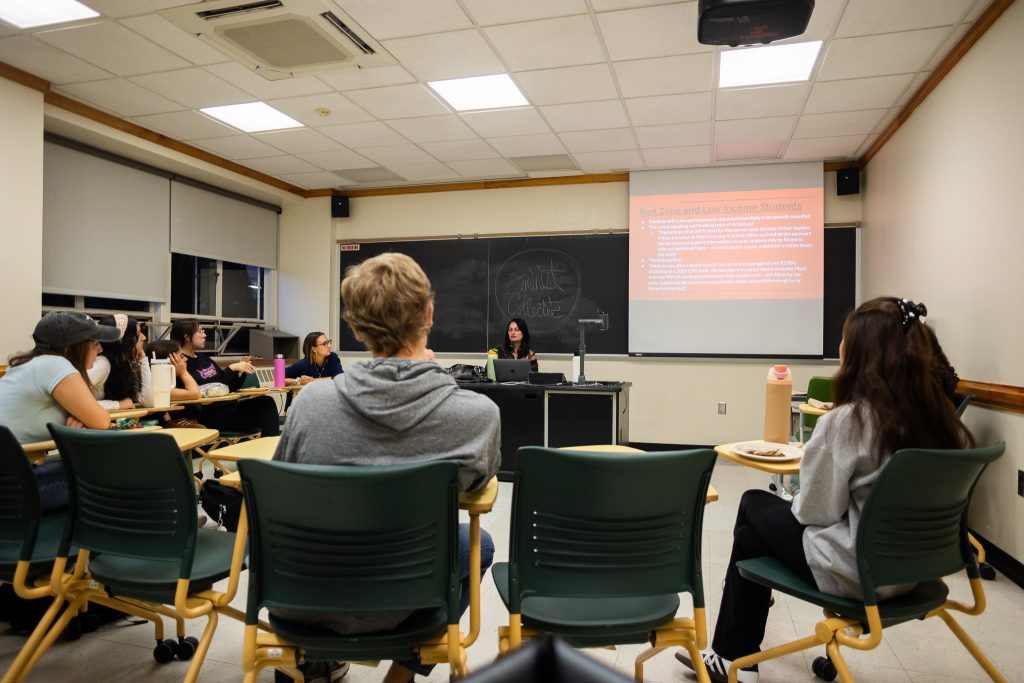The Feminist Collective hosted a variety of events over the past week as part of their Red Zone programming to spread awareness about sexual assault on campus.
The week’s itinerary of events focused on educating students about the Red Zone, a period between the start of the fall semester and Thanksgiving break when first-year students are most vulnerable to sexual assault. For the first time in the campaign’s history, the week began with a chalking of the Spine, educating students about the Red Zone and creating notes of support and solidarity. Then on Wednesday, they held a collective healing discussion surrounding survivor stories with tote bag painting. The week concluded with an educational forum and consent workshop.
“The main thing is that these first two weeks when students get to school, especially freshman, [they need] to be aware of sexual assault and violence that can happen,” said Mia DeVito, the organization’s president and a senior majoring in sociology. “I feel like a lot of people have the complex that this can’t happen to me, won’t happen to me, kind of ideal, whereas it can really happen to anyone. So it’s really about awareness and just precautions that you, as an individual, can take and look out for.”
DeVito said the chalking event was a good start to the initiative because it spread awareness about the week of advocacy and allowed their messaging to reach more students. The tote bag painting fostered a safe space for students, including many first-years, to share serious stories in a relaxed environment.
The consent workshop built on the preceding programming, addressing myths about sexual assault, including that sexual assault cannot happen within relationships, and consent cannot be taken away once it is initially given. Resources on campus, like the University Counseling Center and the Violence, Abuse and Rape Crisis Center, were provided.
“When I was a freshman, I had no idea about all these resources,” DeVito said. “I feel like they should be posted everywhere — they’re not. So resources are something we emphasize at the end of every single meeting we’ve had, at the chalking event, stuff like that. It really is so nice to have these resources on campus, you just got to know about them to find them.”
The organization’s E-Board members also shared statistics about the Red Zone and its correlation with Greek life, saying fraternity men are three times more likely to commit acts of sexual violence than the general population. Certain aspects of Greek life, like hazing, party entrance charges and fraternity political action committees, also perpetuate tendencies that can promote rape culture, the collective said.
Questions were then posed to the group about the role Greek life plays in systematically harming instead of protecting survivors.
“One big thing is that we never really seek to shame anybody who is involved in Greek life and who goes to parties and things like that because we know it is still a part of the experience at Binghamton and people participate in it,” said Hannah Nahmias, the Feminist Collective’s vice president and a senior majoring in sociology. “But there is a clear culture that can become very dangerous and very toxic to anybody who participates in it, and we want to be the people here to spread resources and make people feel safe.”
Although the organization’s Red Zone week is usually held later in the semester, DeVito said she was glad they held it earlier so the information is distributed sooner. The collective added the tote bag painting activity during the collective healing session — which DeVito believed made people more comfortable while discussing heavy topics and led to easier conversations.
On Friday, the collective tabled on the Spine as part of the vice president for student success’ sex campaign, helping to raise money for Family Planning and shared sexual health and reproductive resources to the campus community.
“Honestly, once you hear other people talking about it, more people feel willing to give into the conversation,” DeVito said.



